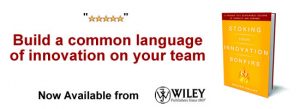Making "I Don't Know" Safe
 Doing new is difficult and scary. For safety, we create complexity and hide behind it; we swim for the weeds; we dive for the details. (At least we’ll come across as knowledgeable about something when we bury our heads in details.) All of this so we can look smart and feel safe.
Doing new is difficult and scary. For safety, we create complexity and hide behind it; we swim for the weeds; we dive for the details. (At least we’ll come across as knowledgeable about something when we bury our heads in details.) All of this so we can look smart and feel safe.
But with new stuff, looking smart and feeling safe are not valid. With new, we don’t know; we’re not smart (yet); there’s no reason to feel safe. (Don’t try, it’s too slow.)
It takes focus and compassion to coax people out of the weeds and help them feel safe. Focus is needed to keep the end game in mind, to constantly keep context in the forefront (why are we here?), to maintain the right compass heading (into the wind). Compassion is needed to make “I don’t know†feel safe. To start, explain the deal: “new†and “I don’t know†are inseparable, a matched set. Like your best pair of wool socks, left without right doesn’t work. If that’s insufficient, tell them if was easy you’d have asked someone else to do it.
Day-to-day, it’s difficult to maintain focus and compassion. I find it helpful to remember it’s natural to seek safety in the weeds. We all do it. Keep that in mind while you do new as fast as you can.
Don’t miss an article (2,350+) – Subscribe to our RSS feed and join our Innovation Excellence group!
 Dr. Mike Shipulski (certfied TRIZ practioner) brings together the best of TRIZ, Axiomatic Design, Design for Manufacturing and Assembly (2006 DFMA Contributor of the Year), and lean to develop new products and technologies. His blog can be found at Shipulski On Design.
Dr. Mike Shipulski (certfied TRIZ practioner) brings together the best of TRIZ, Axiomatic Design, Design for Manufacturing and Assembly (2006 DFMA Contributor of the Year), and lean to develop new products and technologies. His blog can be found at Shipulski On Design.
NEVER MISS ANOTHER NEWSLETTER!
LATEST BLOGS
Innovation in Pet Ownership?
Recently I heard a guy telling a story about how he goes out a few times a year on a…
Read MoreAre $300 Jeans an Innovation?
I came across an interesting article by Chip Heath and Dan Heath in Fast Company. The article hypothesizes that people’s…
Read More



